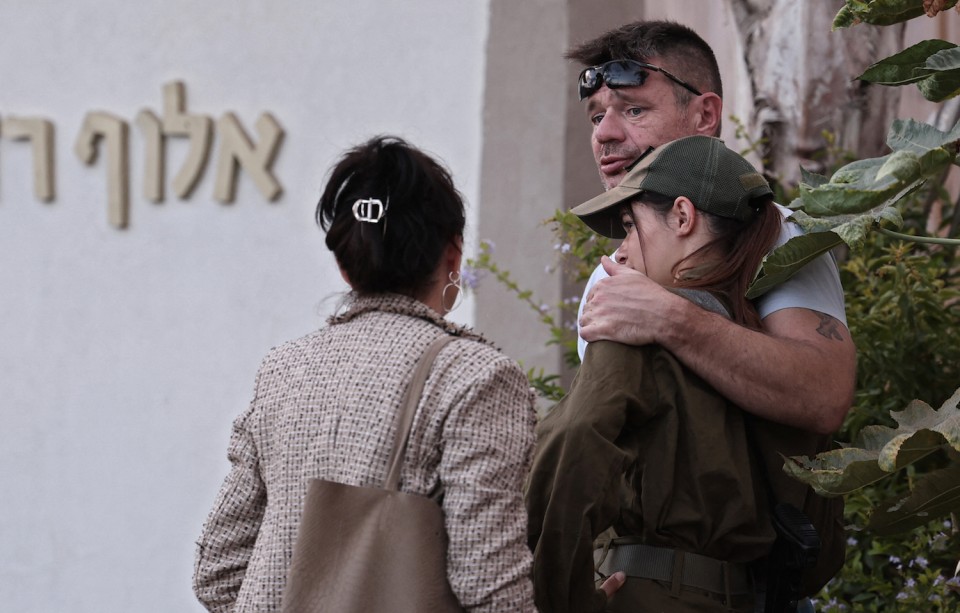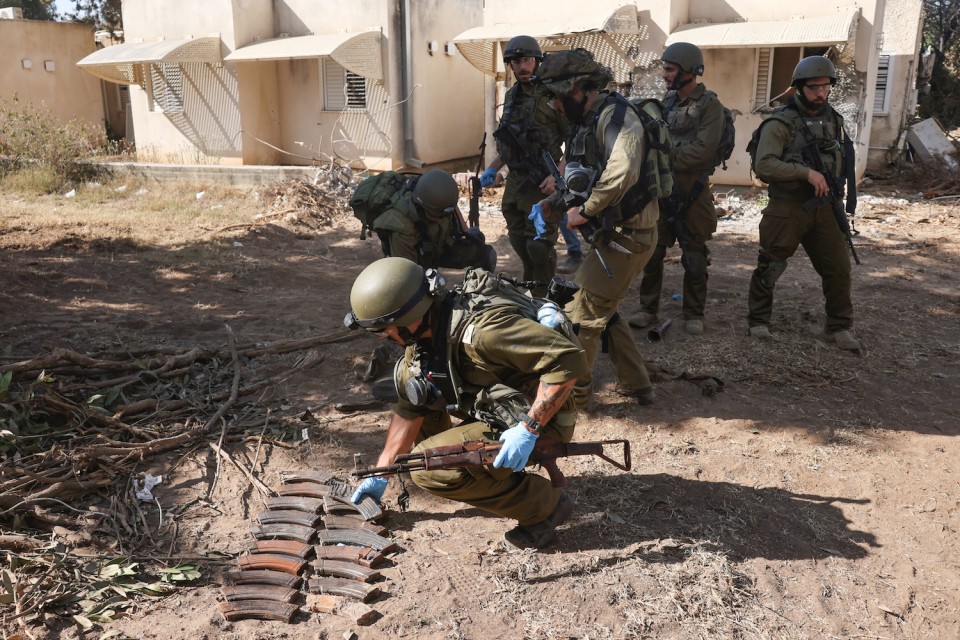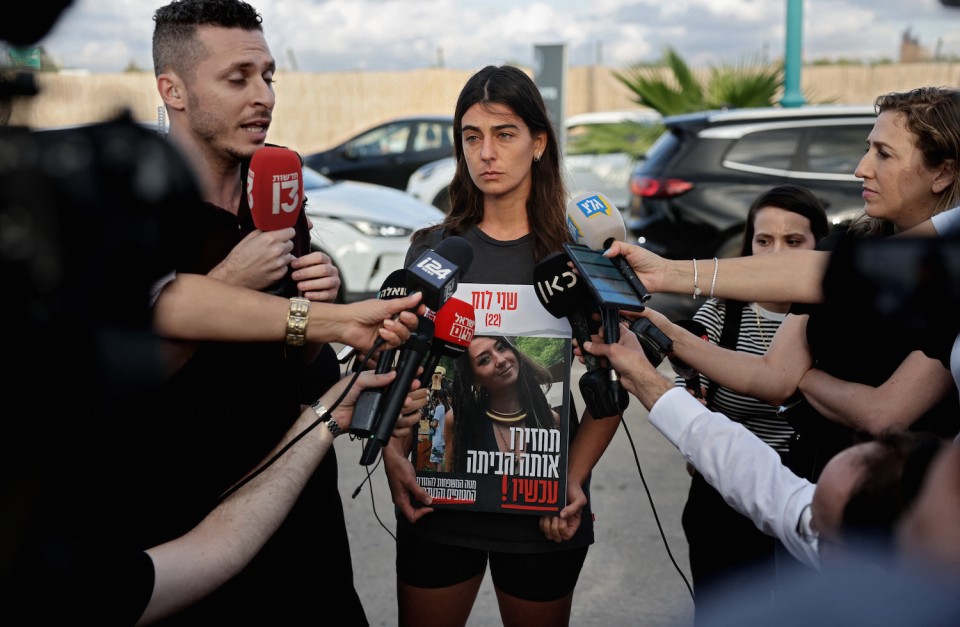
By Mai YAGHI with Jay DESMUKH in Jerusalem
GAZA STRIP, Palestinian Territories, Oct 15, 2023 (AFP) – More than one million people have been displaced in the Gaza Strip in the last week, the UN said Sunday, after sustained Israeli bombardment and warnings about a ground attack targeting Hamas commanders.
Israel declared war on the Islamist group last Sunday, a day after waves of fighters broke through the heavily fortified border and shot, stabbed and burned to death more than 1,400 people, most of them civilians.
Seven days of relentless bombing targeting those who masterminded the attack have flattened neighbourhoods and left at least 2,670 people dead in the Gaza Strip, the majority ordinary Palestinians.
As Israel seeks to avenge the worst attack in its history, the Arab League and African Union warned the invasion could lead to “a genocide of unprecedented proportions”.
It also faced a grave warning about the wider security implications of putting boots on the ground in the densely populated enclave.
“No one can guarantee the control of the situation and the non-expansion of the conflicts” if Israel sends its soldiers into Gaza, said Iran’s foreign minister Hossein Amir-Abdollahian.
“Those who are interested in preventing the scope of war and crisis from expanding need to prevent the current barbaric attacks… against citizens and civilians in Gaza,” he added.
Iran is Israel’s number one enemy and as well as funding Hamas also backs Hezbollah in Lebanon to the north, where cross-border fire has intensified in the last week, prompting Israel to shut the area to civilians.
The UN peacekeeping mission UNIFIL on Sunday said its base was hit by a rocket but no one was hurt.
Defence Minister Yoav Gallant said Israel had “no interest in a war in the north, we don’t want to escalate the situation”.
“If Hezbollah chooses the path of war, it will pay a heavy price… but if it restrains itself, we’ll respect the situation,” he said.
– Escalation risk –
The United States, which has given unequivocal backing to Israel, is concerned about violence spreading, and has sent two aircraft carriers to the eastern Mediterranean as a deterrent.
In Washington, White House National Security Adviser Jake Sullivan said they feared the prospect of Iran becoming “directly engaged”, after it praised the Hamas attack but insisted it was not involved.
US Secretary of State Antony Blinken has in recent days toured Middle Eastern capitals in a frantic round of diplomacy to try to avert a wider crisis in the volatile region.
On Sunday, he pointed to “determination in every country I went to make sure that this doesn’t spread,” as he left Egypt.
Blinken has appealed to China to use its influence in the region to ease tensions.
But on Sunday Foreign Minister Wang Yi said Israel’s response had “gone beyond the scope of self-defence”.
He called on Prime Minister Benjamin Netanyahu and his emergency government to “cease its collective punishment of the people of Gaza”.

– Evacuations –
Israel has massed thousands of troops and heavy weaponry in the desert south of the country, waiting for the green light to go in to northern Gaza.
The army has told 1.1 million Palestinians in the north of the Gaza Strip — nearly half of its 2.4-million population — to head south to safety.
But there were still Israeli air strikes in the south, including in Rafah, where one resident said a doctor’s house was targeted.
“All the family was wiped out,” said Khamis Abu Hilal.
On the other side of the border, Israelis were moving to safer areas, boarding buses as ground-shaking booms were heard from nearby Gaza, and sirens wailed warning of incoming rocket fire.
Military spokesmen Lieutenant Richard Hecht and Daniel Hagari said any ground offensive would be triggered by a “political decision”.
Netanyahu visited frontline troops on Saturday, telling them “more is coming” but without specifying when any ground operation would start.
Hecht singled out Yahya Sinwar, the chief of Hamas in Gaza blamed for the October 7 attacks, calling him “a dead man walking”.
Aid agencies, including the UN and ICRC, as well as foreign governments have repeatedly criticised Israel’s request for Gazans to leave their homes.
The UN agency supporting Palestinian refugees said on Sunday that some one million Palestinians had already been displaced in the first week of the conflict.
“The number is likely to be higher as people continue to leave their homes,” UNRWA director of communications Juliette Touma told AFP.
UNRWA commissioner general Philippe Lazzarini later described the situation as “unprecedented human catastrophe”.
Palestinians carrying whatever belongings they can, in bags and suitcases, or packed onto three-wheeled motorbikes, battered cars, vans and even donkey carts have become a common sight in recent days.
They have had to find shelter wherever they can in the increasingly crowded south of the Gaza Strip, including in the streets and UN-run schools.
Israel had cut off water, fuel and food supplies to Gaza for the duration of the conflict. Local hospitals are becoming overwhelmed with increasing numbers of dead and injured.
Health officials on Sunday said some 9,600 people had been injured.
Israeli energy minister Israel Katz on Sunday said water supplies to southern Gaza had been switched back on.
“This will push the civilian population to the southern Strip,” he said.
But power outages threatens to cripple life-support systems, from sea water desalination plants to food refrigeration and hospital incubators.
Gazans are effectively trapped, with Israeli-controlled crossings closed and Egypt also having shut the Rafah border in the south.
Convoys of humanitarian aid are stacked up on the Egyptian side, witnesses told AFP.

– Hostages –
The mood in Israel has swung between collective grief, fury and a strong desire to punish Hamas, which Netanyahu has likened to the Islamic State group.
There are also deep fears about the safety of 155 hostages taken to the Gaza Strip.
“We must bring them back home alive,” said a tearful Yrat Zailer, the aunt of children aged nine months and four years who were abducted with their mother.
Israel pushed on with its evacuation of southern towns close to Gaza that were targeted in the Hamas attacks.
Packed buses were taking families to hotels in Jerusalem and the Red Sea resort city Eilat.
“It’s hard, I’m crying,” said Helen Afteker, 50, an evacue from the town of Sderot. “It’s terrifying every time there’s a warning, we have to leave. It’s better for the children.”
Planeloads of Israelis have returned from around the world to join the latest of the many wars in their country’s 75-year history.







